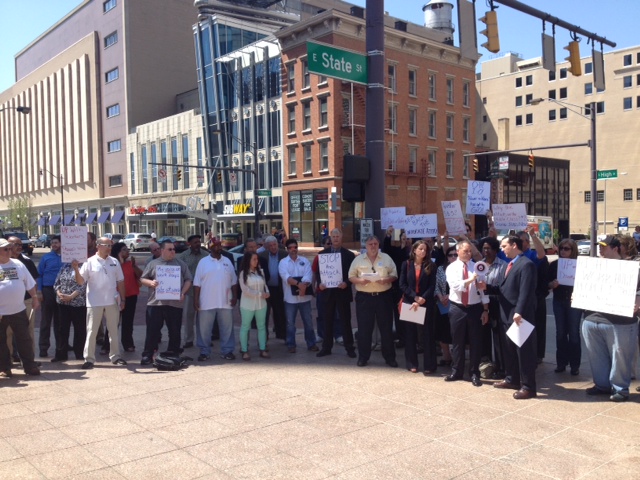|
|
Government and Politics
Wednesday, May 1, 2013
UPDATE: GOP leader signals 'right-to-work' bills may go no where in Ohio
Ohio Senate leader expects the controversial package of House bills will die in the Statehouse
by WKSU's STATEHOUSE CORRESPONDENT JO INGLES |

Reporter
Jo Ingles | | |
 | | State Rep. Kristina Roegner (R-Hudson) says Ohio needs this legislation to stay competitive with Michigan, Indiana and other states when it comes to attracting business | | Courtesy of Jo Ingles |
UPDATE 3 a.m., May 2, 2013: In a a written statement issued late last night, Ohio's Senate President Keith Faber said he doesn't think any of the 'right-to-work' bills will be passed by the General Assembly. After talking with legislative leaders, Faber says he doesn't think the bills have support and the only purpose the debate serves now is to "generate a bunch of breathless fundraising appeals from the Ohio Democratic Party."
House Legislation that would allow Ohio workers to opt out of paying union dues has been introduced in the Ohio Legislature. And as Ohio Public Radio’s Jo Ingles reports, the bills -- including one drawn up by a Northeast Ohio Republican -- are already drawing protests. |
Ohio and right-to-work billsOther options:  MP3 Download (4:04) MP3 Download (4:04)
|
Three bills have been introduced in the Ohio House. One would allow private sector workers to opt out of paying union dues. Another would allow public sector workers to do the same. And another proposal would give lawmakers the chance to put the issue on the ballot so Ohio voters could decide whether workers should pay union dues. The Republican sponsors of the measures, including Rep. Kristina Roegner of Hudson, are calling them workplace freedom legislation. And they say it would be up to Ohio lawmakers to decide which, if any, of the bills they pass.
Staying competitive
Over the protests of Democrats and unions, Michigan and Indiana have already adopted similar laws, commonly known as 'right-to-work' laws. And Roegner says Ohio better do the same to stay competitive.
She says CEOs looking at states where all else is equal will opt for the one with ""workplace freedom."
Maag says bills equal job growth
Two years ago, Ohio's Republican lawmakers passed a bill slashing the bargaining clout of public employee unions. Voters overwhelmingly repealed the law in a referendum. 
But Roegner says these new bills are different because the new ones speak only to paying union dues. Republican Rep. Ron Maag, another sponsor of these bills, says studies show private sector employment in Midwest states with these kinds of laws grew by 6.8 percent between 2001 and 2011 while dropping in Midwest states without these laws. He said employment dropped more than 2 percent in Ohio. And he claims employees in "workplace freedom" states make more money.
"I cannot see the controversy here," says Maag. It's "the workers right to choose. How can anybody say anything bad about that?"
AFL-CIO protests
About 50 union members did say plenty of bad things about that. They rallied at the Statehouse even before the bills were introduced. Tim Burga is the head of Ohio’s largest labor union coalition, the AFL-CIO.
"This is bad for Ohio. It’s going to make us less free, less safe and worse off."
Burga says the Republicans who are pushing this idea don’t have their facts straight.
"These are multi-national corporations and extremists that are pushing this. And when’s the last time a multi-national corporation sought legislation or sought to put something on the ballot to help middle-class families?"
"It’s going to take away the rights of whistleblowers at the workplace. It’s going to drive down median family incomes. States with so-called 'right to work' earn $6,400 less than free bargaining states like Ohio. Workplace death rates are 36 percent higher in so called 'right-to-work' states."
Mirroring SB5
Burga says his union members and others are ready to fight the bills head on, just as they fought S.B. 5 two years ago. And Democrats, like Sen. Nina Turner, have already joined unions in the fight
"It is going to bring everybody together," she said. "They are attacking the private sector on one hand, the public sector on the other. And it’s just going to bring the happy family together again. I don’t know what the Republicans are thinking."
She suggested the legislative redistricting that leans in Republican lawmakers' favor may be behind the bill because "they are so safe that they can do anything to the citizens of the state of Ohio.
The fight over the bills comes at a time when next year’s gubernatorial campaign is just starting. Already, Ed FitzGerald, who is seeking the Democratic nomination, is arguing against the bills. Republican Gov.John Kasich, a supporter of the labor law that voters repealed two years ago, has yet to weigh in on these new bills. Recently, he dodged questions about whether he supports these kinds of proposals, whether they are OK'd by legislators or by voters. |
(Click image for larger view.)
|
|
|
|